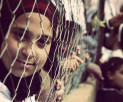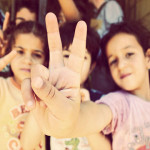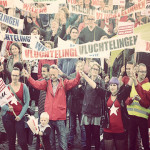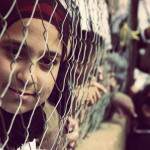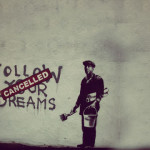In a rubber dinghy to Europe
It was the last year of secondary school, the year before Maria (20) would go to university. ‘Everything was going well. I studied hard and dreamed about going on to study pharmacy after that year.’ The war in Syria made it impossible for Maria to realise her dream in her homeland. ‘There were days when I could not go to school because it was too dangerous. It was always turbulent and you never knew what was going to happen. It frightened me.’
Too dangerous
In May 2013, the situation in her area became intolerable and Maria fled with her mother, sister, brother and cousin to Europe. Her father had passed away earlier in the war. ‘I studied up until the last day. I wanted to be sure that I was well prepared for my exams. I did not know if I would go back to Syria again.’
As the family leaves their house behind, they hear bombs falling. ‘We heard them every day’, recounts Maria. They leave their home in Kamishli with only the most necessary of items and fly to Damascus. ‘I found it very difficult to leave everything behind’, she tells. From the capital, they continue their journey by car to Lebanon to catch a plane from there to Egypt.
‘I jumped in the sea’
‘We were sitting squashed in the boat’
At the coast in Egypt, there is a small rubber dinghy waiting. ‘We had to get in a boat which was suitable for ten people. But there were more than twenty of us, so we had to leave behind the things we had brought with us. The only things I still had were the clothes I was wearing.’
Maria and her family sail for half an hour until they cannot see land anymore. Eventually, there is a new boat which will bring them to Europe. ‘We had to jump in the sea to get to the other boat. It was a very old, dirty boat, and it was even smaller than the last one. We were sitting squashed in the boat, and there was barely any food or water.’
After three days, everyone had to switch to a third boat. That one was better than the second one, Maria says. ‘We had to jump into the water again to reach the new boat. The wind was strong and it was very dangerous. Everyone was scared and was praying to God.’ After a few days, everyone had to get into the second boat, which had sailed alongside them the whole way. ‘It was extremely uncertain. I did not know if they would really take us to Europe. When I finally saw land, it felt like a dream.’
Unknown destination
‘When we reached Europe, I had no idea where we were.’ Maria and her family drive to the Netherlands, where they end up at the registration centre in Ter Apel. They stay there a month. After that, they receive a residence permit and move to a new camp in Sint Annaparochie. A month later, the family finds a house in Enschede.
‘I do not want to go anywhere else again’Via the UAF, an organisation which helps highly-educated refugees to find a place in society, Maria is doing a preparation year for university. She is going to live with a host family who also come from Syria in a small village just outside Groningen. Last month, she began her dream study: pharmacy.
The future
Maria’s most important goal at this moment is to pass her courses, although the language barrier is sometimes difficult. ‘I do not understand everything that is said during lectures. That frustrates me. But I think it will be ok. If I want it, I can do it.’
She does not know what she will do after her study yet. ‘I always wanted to work in the industry and make medicines, but being a pharmacist would also be nice.’ She knows one thing for sure: she is not going back to Syria. ‘That country has not helped me. I wanted to study there, but I did not get the chance. I am happy that I am here now. I do not want to go anywhere else again.’
Per request by the interviewee, the name ‘Maria’ is a pseudonym.


